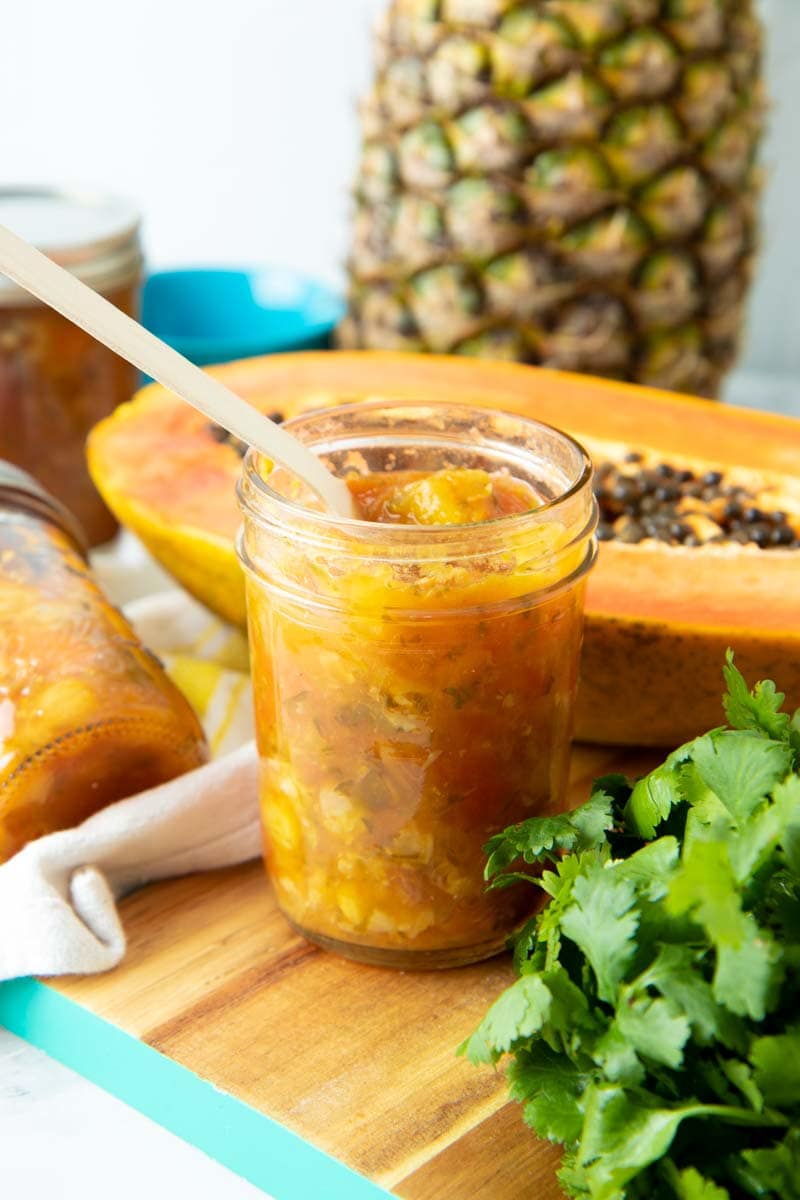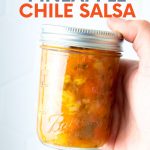When it’s time to can salsa each summer, I always stock my pantry shelves with two kinds: a big batch of classic tomato salsa—which is so versatile and always a must-can for me—and a batch of fruit salsa like this Pineapple Papaya Chili Salsa.
This salsa is sweet, fruity, tangy, and addictingly spicy! In our house, we eat it with grilled pita wedges, as a condiment for grilled fish (especially fish tacos—yum!), and honestly, just by the spoonful! Because of their high acid levels, fruit salsas are incredibly easy canning recipes that are perfect for canning beginners. Because this recipe is tested and approved by the makers of Ball® home canning products, you can feel good about making it for your family! Let’s get canning.
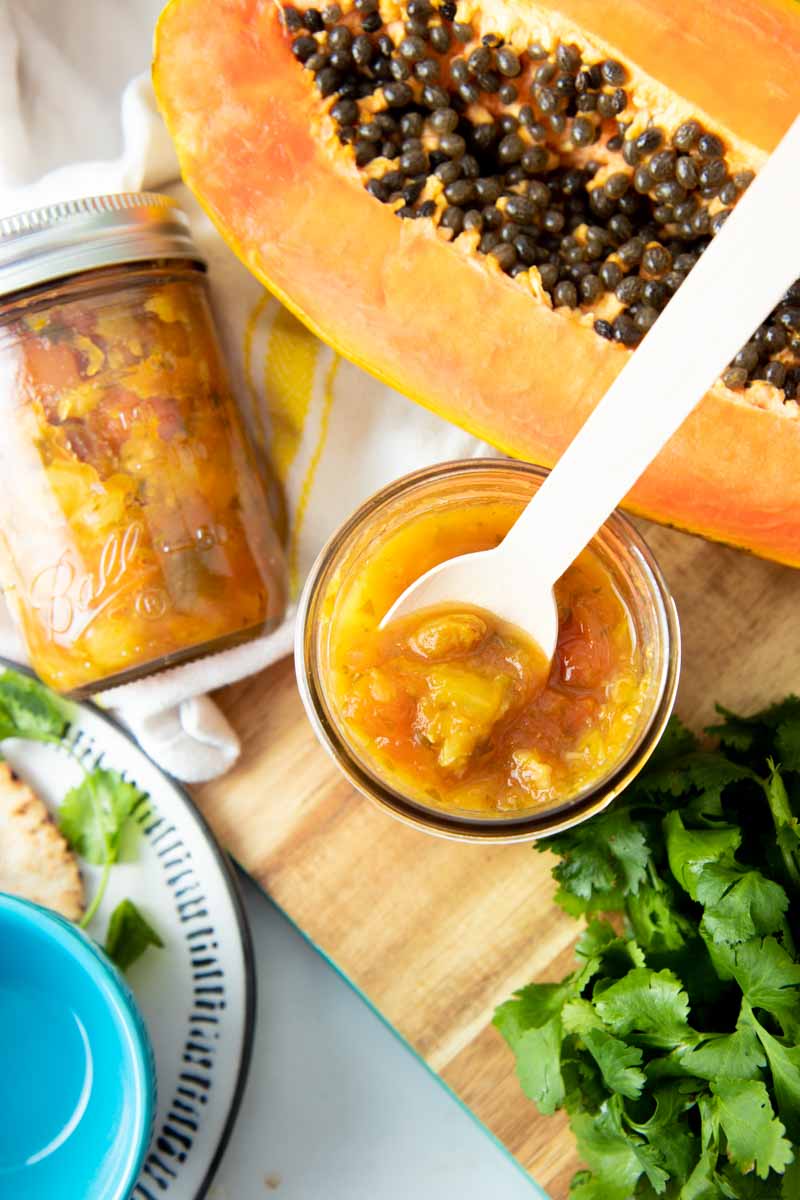
What is papaya pineapple salsa?
Pineapple salsa is a fruity dip typically made with pineapple (obviously), herbs, and hot peppers to make a delightfully sweet-spicy condiment. Pineapple salsa can be made fresh or canned like we do here.
What is this salsa made of?
This salsa is made of ingredients that are easy to grab at any supermarket. If you are lucky enough to live in a tropical region, you might be able to snag these items fresh at your local farmers’ market.
- Fresh papaya: A papaya is ripe when it’s almost entirely yellow and slightly soft to the touch.
- Fresh or canned pineapple: If you have a hard time tracking down a ripe fresh pineapple, canned pineapple chunks will do the trick!
- Golden raisins
- Lemon and lime juice: For canning, you want to grab bottled lemon and lime juice. The acidity level of fresh citrus varies, but the acidity level of bottled citrus juice is regulated so that you can ensure consistently safe results.
- Pineapple juice
- Chile peppers
- Green onion
- Cilantro
- Brown sugar
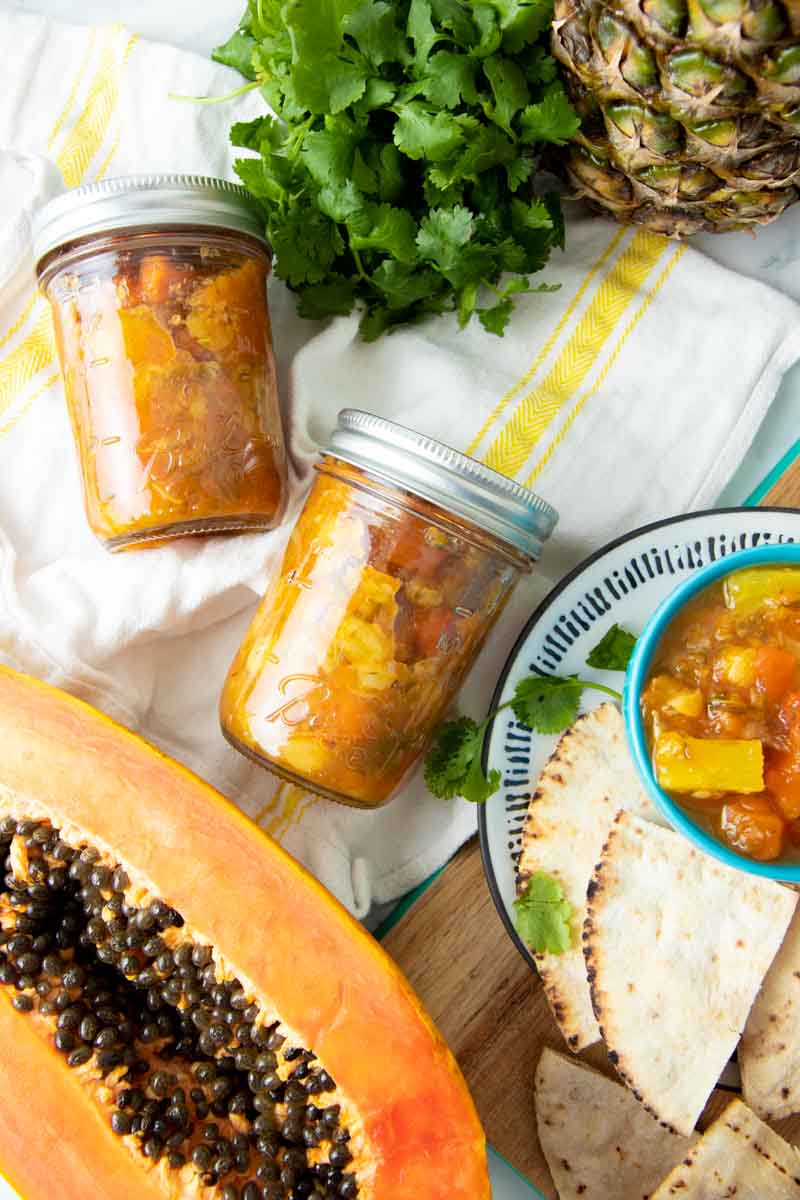
What kind of peppers do I need?
You have some flexibility here with the kind of pepper you use, just as long as you stick to the measured amount (which is the correct ratio to keep this salsa acidic enough to be safe for water bath canning at home). Here’s what we recommend:
- Anaheim peppers—mild
- Hot banana peppers—mild
- Poblano peppers—mild to medium
- New Mexico chiles (AKA: Hatch chiles)—mild to medium

How do I can papaya pineapple salsa?
While this salsa does require a decent amount of chopping, that’s about as complicated as it gets! Here’s what you’ll need to do to can this salsa:
- Prepare water bath canner and heat jars in simmering water until ready to use. Wash lids with warm soapy water, and set clean lids and rings aside.
- Chop and prepare all ingredients as listed in the recipe.
- Combine all ingredients in a large stockpot over medium-high heat, stirring constantly. Boil gently until slightly thickened, about 10 minutes.
- Ladle the hot salsa into a hot jar, leaving 1/2 inch of headspace. Remove air bubbles, wipe jar rim, and then fit the lid and ring to the jar—just until fingertip tight. Place jar in the canner, and then repeat with remaining jars and salsa.
- Bring canner to a rolling boil, and then process for 15 minutes, adjusting for altitude. Turn off heat, remove lid, and wait for 5 minutes before removing the jars (this helps prevent siphoning).
- Remove jars and place on a cutting board or towel, and let cool for 12-24 hours. Check lids for seal—they should not flex when the center is pressed down.
Wholefully Protip
Always prepare more jars than the recipe calls for. It’s easy to put a jar back on a shelf if you don’t need it, but it’s frustrating to have to stop in the middle of filling jars to prepare more jars if you run out.
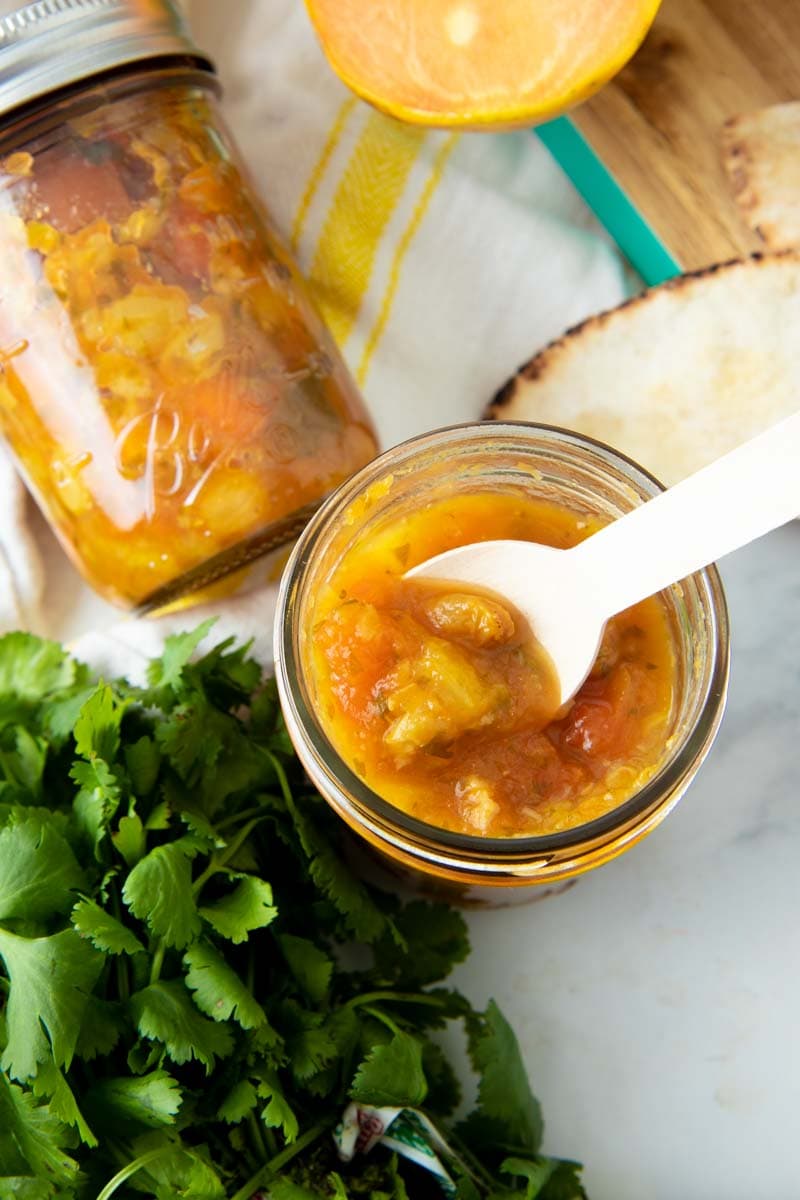
What are the best jars to use for this recipe?
Since this salsa is most frequently used as a condiment in our house, we keep it in small jars—canning it in Ball® Regular Mouth Half-Pint Jars. That’s the perfect amount to serve with fish tacos without any leftovers to go bad in the back of the fridge! Any Ball® Half-Pint Jar would work for this recipe.
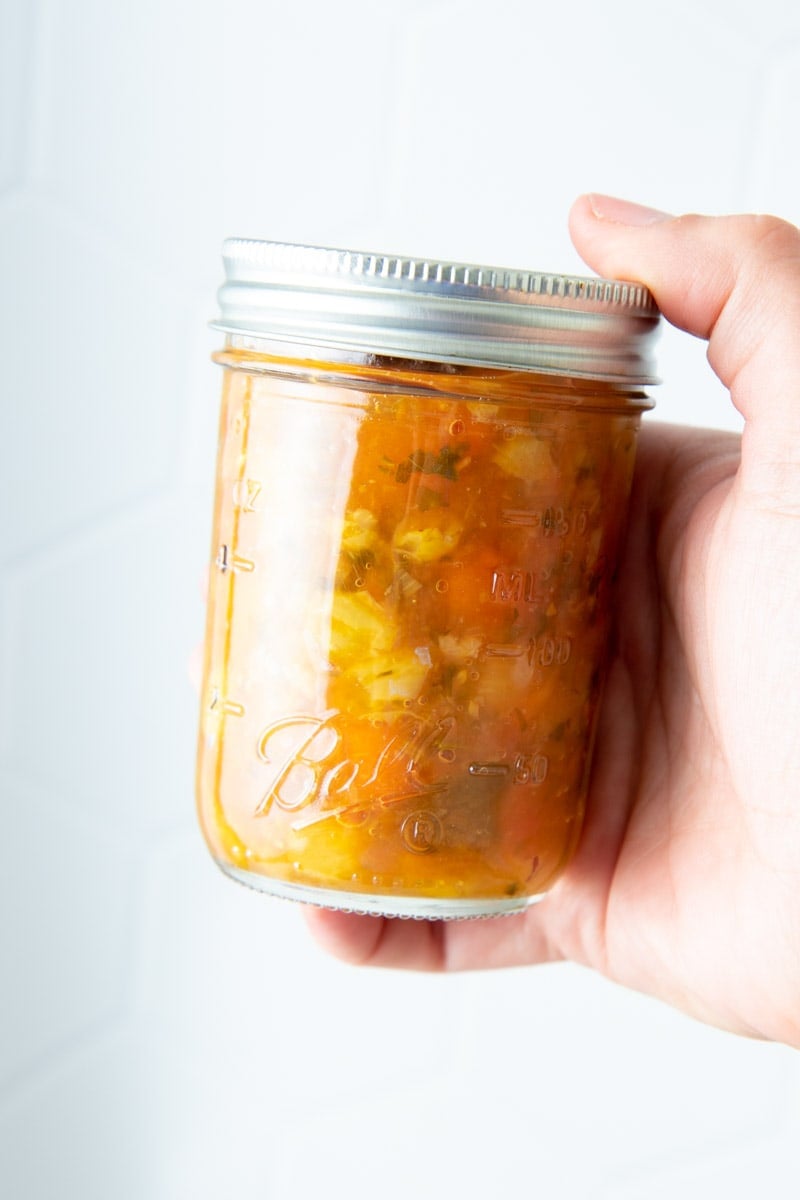
What can you use this pineapple salsa for besides chips?
Here are our favorite ways to use fruity salsa:
- Piled on top of grilled fish—this pineapple salsa is particularly wonderful on grilled salmon!
- Tucked inside a fish taco—the sweet and spicy flavor pairs beautifully with some shredded cabbage and breaded fish in a taco!
- As a fast appetizer—brush some olive oil on some pitas, grill them until warm, and then cut them into wedges. Serve the warm pita with the salsa for an easy appetizer.
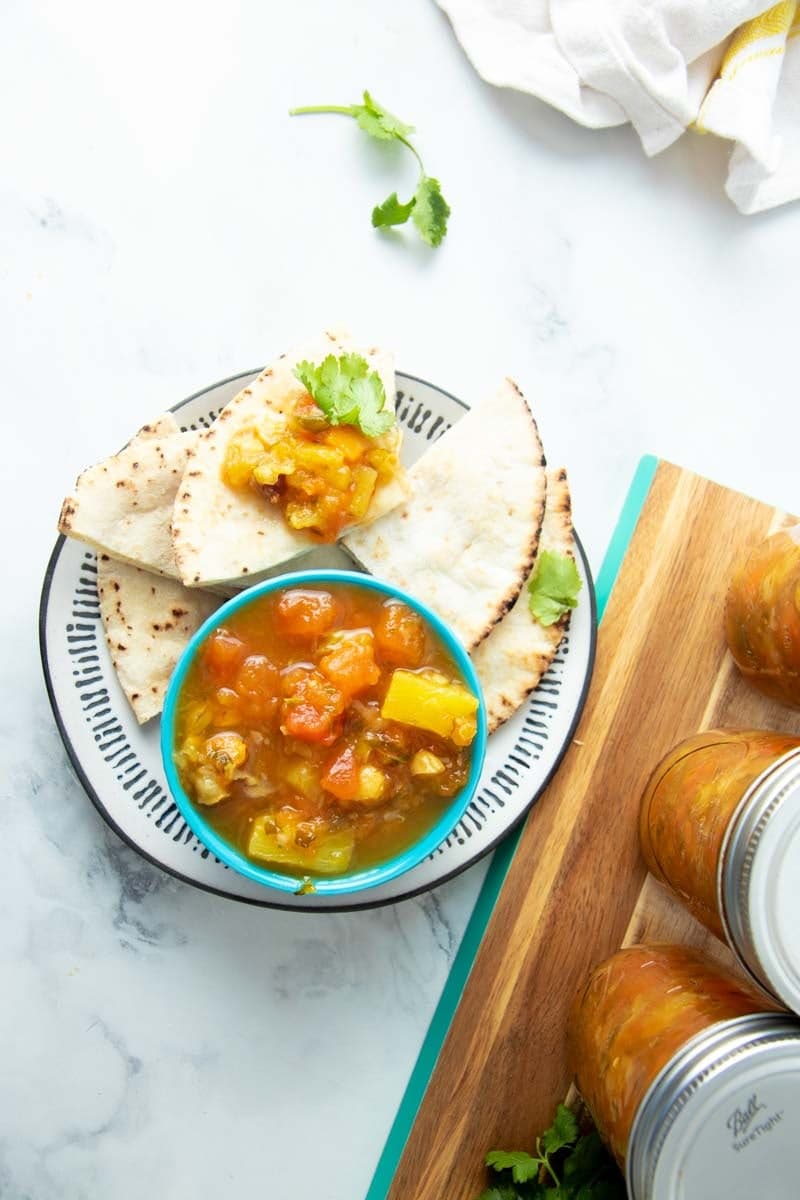
Can you freeze papaya pineapple salsa?
This particular recipe is meant for canning, but if canning isn’t your thing, this recipe can definitely be frozen. Prepare the salsa through the cooking step. Allow the salsa to cool completely, and then ladle into room temperature, freezer-safe Ball® jars. Freezer-safe jars are wide-mouth jars without shoulders (we like freezing things like this salsa in Ball® Wide-Mouth Pint Jars). These jars have lines on the side of the jar to mark the 1/2″ headspace you need to leave to allow for expansion during freezing.
Frozen salsa will last for up to 6 months.
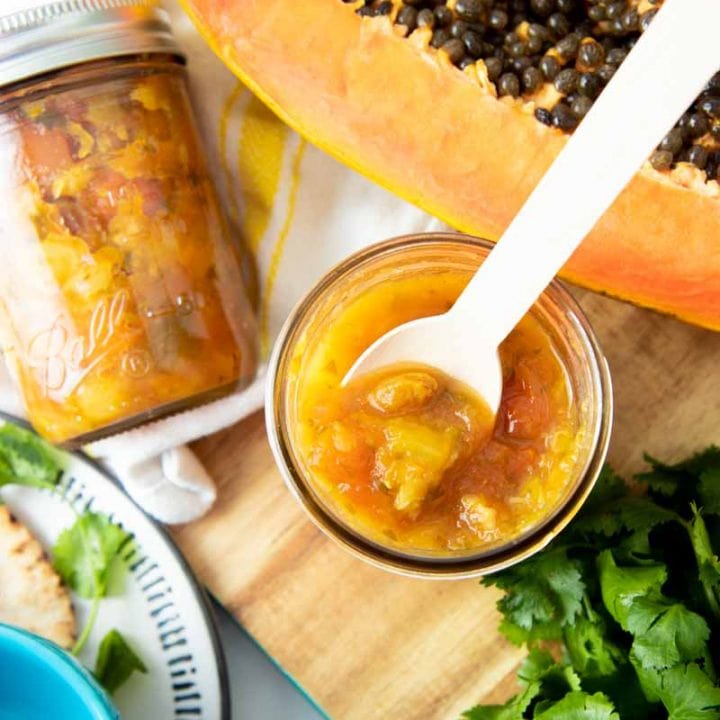
Pineapple Papaya Chili Salsa
Put up this spicy-sweet papaya pineapple salsa so you can enjoy a taste of the tropics all year round.
Recipe courtesy of the makers of Ball® home canning products.
Ingredients
- 4 cups cubed seeded peeled papaya (about 2 lb or 2 med)
- 2 cups cubed cored peeled fresh pineapple (about half of a medium pineapple) or canned pineapple (about 1 20-oz can)
- 1 cup golden raisins
- 1 cup lemon juice
- 1/2 cup lime juice
- 1/2 cup pineapple juice
- 1/2 cup chopped seeded Anaheim peppers (poblano, New Mexico chilies or hot banana peppers may be used as a substitute)
- 2 Tbsp finely chopped green onion
- 2 Tbsp finely chopped cilantro
- 2 Tbsp packed brown sugar
Instructions
- Prepare boiling water canner. Heat jars in simmering water until ready for use. Do not boil. Wash lids in warm soapy water and set aside with bands.
- Combine all ingredients in a large stainless steel saucepan and bring to a boil over medium-high heat, stirring constantly. Reduce heat and boil gently, stirring frequently, until slightly thickened, about 10 minutes.
- Ladle hot salsa into hot jars, leaving 1/2 inch headspace. Remove air bubbles. Wipe jar rim. Center lid on jar and apply band, adjust to fingertip tight. Place jar in boiling water canner. Repeat until all jars are filled.
- Process jars for 15 minutes, adjusting for altitude. Turn off heat, remove lid, let jars stand 5 minutes. Remove jars and cool 12-24 hours. Check lids for seal, they should not flex when center is pressed.
Nutrition Information:
Yield: 48 Serving Size: 2 tablespoonsAmount Per Serving: Calories: 28Total Fat: 0gSaturated Fat: 0gTrans Fat: 0gUnsaturated Fat: 0gCholesterol: 0mgSodium: 3mgCarbohydrates: 7gFiber: 1gSugar: 6gProtein: 0g
At Wholefully, we believe that good nutrition is about much more than just the numbers on the nutrition facts panel. Please use the above information as only a small part of what helps you decide what foods are nourishing for you.

